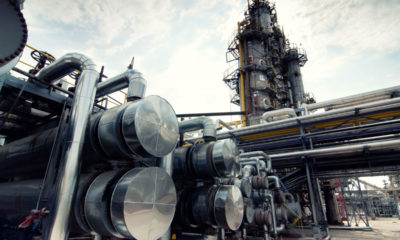Plans to conclude operations at the Dangote Fertiliser Limited (DFL) are underway as the Dangote Group partners the Nigerian National Petroleum Company (NNPC) Limited, Shell, Nigerian Agip Oil Company (NAOC) Limited, Total Energies, as well as the Gas Aggregation Company of Nigeria (GACN) for the supply of gas.
The Gas Sale and Aggregation Agreement (GSAA) which was signed in Abuja will see to the adequate supply of 70 million standard cubic feet per day of natural gas to DFL.
Investors King gathered that the gas supply agreement will guarantee the availability of the major raw material needed to run the Dangote Fertiliser plant.
The Nigerian Midstream and Downstream Petroleum Regulatory Authority (NMDPRA) had earlier released the new Domestic Gas Demand Requirements (DGDR) for 2022, with gas supply to the power sector pegged at 2.324 billion standard cubic feet per day.
Founder of the Dangote Group, Aliko Dangote, who spoke during the contract-signing event, noted that the deal would save the country the sum of $1.8 billion in foreign exchange. He reiterated the commitment of the Dangote group in ensuring that Nigeria retains a large chunk of its foreign exchange.
“This additional gas will help bring in more foreign exchange into the country, especially with the current energy crisis. With our fertiliser plant, Notore, and Indorama, we are second in Africa. Apart from Egypt, no other African country has our capacity.
“We will meet domestic market and also export and we are talking about $1.8 billion (savings) in terms of foreign exchange coming into the country,” he said.
While commending all partners for their efforts, Managing Director of the Shell Petroleum Development Company and Country Chair, Shell Companies in Nigeria, Mr. Osagie Okunbor, revealed that the agreement is the fastest GSAA ever in the country.
Also speaking, Group Managing Director of NNPC, Mallam Mele Kyari said the initiative is the government’s drive to ensure that Nigeria becomes self-sufficient in the production of fertiliser, and as well, discourage the import of fertilizer into the country.
“As you are aware, Dangote fertilizer is one of the biggest producers of fertilizer and this deal, which is to offer 70m scuf per day to Dangote fertilizer by the JV, will contribute to the surge of Fertilizer production in Nigeria. Of course, it will tremendously be positive to our agro-economy”, he added.

 Naira4 weeks ago
Naira4 weeks ago
 Naira4 weeks ago
Naira4 weeks ago


 Naira4 weeks ago
Naira4 weeks ago




 Naira3 weeks ago
Naira3 weeks ago
 Commodities4 weeks ago
Commodities4 weeks ago


 News4 weeks ago
News4 weeks ago


 Banking Sector4 weeks ago
Banking Sector4 weeks ago
 Travel4 weeks ago
Travel4 weeks ago






















